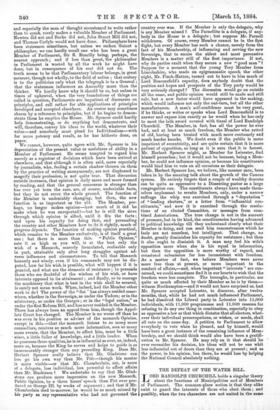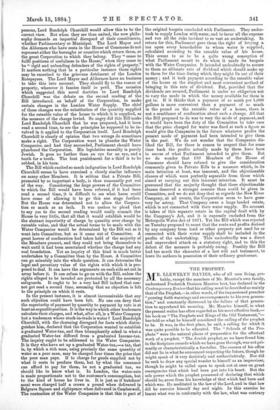THE DEFEAT OF THE WATER BILL.
IORD RANDOLPH CHURCHILL holds a singular theory J about the functions of Municipalities and of Members of Parliament. The common-place notion is that they alike exist to guard the interests of those who elect them ; and possibly, when the two characters are not united in the same
persons, Lord Randolph Churchill would allow this to be the correct view. But when they are thus united, the new philo- sophy demands an impartial disregard of their constituents, whether Parliamentary or Municipal. The Lord Mayor and the Aldermen who have seats in the House of Commons do not represent either the boroughs or counties which return them, or the great Corporation to which they belong. They " cease to fulfil positions of usefulness in the House," when they cease to be " rigid and unbending defenders of the rights of property." It matters nothing that in a particular instance these rights may be exercised to the grievous detriment of the London Ratepayers. The Lord Mayor and Aldermen have no business to take this into account. They should fly to the rescue of property, wherever it fancies itself in peril. The occasion which suggested this novel doctrine to Lord Randolph Churchill was the debate on the second reading of the Bill introduced, on behalf of the Corporation, to make certain changes in the London Water Supply. The chief of these changes was the substitution of the quantity supplied for the rateable value of the house to which it is supplied, as the measure of the charge levied. So angry did this Bill make Lord Randolph Churchill that he was prepared, had it been read a second time, to see the principles he supposed to be in- volved in it applied to the Corporation itself. Lord Randolph Churchill is clearly of opinion that two wrongs do sometimes make a right. The Corporation want to plunder the Water Companies, and had they succeeded, Parliament should have plundered the Corporation. His legislative morality is purely Jewish. It goes no further than an eye for an eye, and a tooth for a tooth. The best punishment for a thief is to be robbed, in his turn.
The Bill which excited so much indignation in Lord Randolph Churchill seems to have exercised a closely similar influence on many other Members. It is seldom that a Private Bill, promoted by so important a body, is thus summarily put out of the way. Considering the large powers of the Committee to which the Bill would have been referred, if it had been read a second time, it is difficult to see what harm could have come of allowing it to go this one stage further. But the House was determined not to allow the Corpora- tion so much as an inch. It was useless to plead that to say yes to the second reading would really commit the House to very little, that all that it would establish would be the abstract superiority of charge by quantity over charge by rateable value, and that the actual terms to be made with the Water Companies -would be determined by the Bill not as it went into Committee, but as it came out of Committee. A great horror of confiscation had taken hold of the majority of the Members present, and they could not bring themselves to wait until it had been ascertained whether the charge had any real foundation. Yet an inquiry of this kind is much better undertaken by a Committee than by the House. A Committee can go minutely into the whole question. It can determine the legal and pecuniary value of the rights with which it is pro- posed to deal. It can have the arguments on each side set out in array before it. It can refuse to go on with the Bill, unless the rights alleged to be invaded are protected by all the necessary safeguards. It ought to be a very bad Bill indeed that can- not get read a second time, assuming that no objection is felt to the principle on which it rests.
In the present instance, it is almost inconceivable that any such objection could have been felt. No one can deny that the superiority of payment by quantity to payment by rate is at least an arguable position. It is the way in which other tradesmen calculate their charges, and what, after all, is a Water Company but a tradesman whose stock-in-trade is water ? Lord Randolph Churchill, with the charming disregard for facts which distin- guishes him, declared that the Corporation wanted to establish a graduated Water-tax, and then triumphantly asked in what a graduated Water-tax differed from a graduated Income-tax. The inquiry ought to be addressed to the Water Companies. It is they who have set up a graduated Water-tax,—a tax, that is, by which a rich man, using precisely the same quantity of water as a poor man, may be charged four times the price that the poor man pays. If to charge for goods supplied not by what it costs to produce them, but by what the consumer can afford to pay for them, be not a graduated tax, we should like to know what is. In London, the water-rate
is made proportionate not to the customer's consumption, but to, the kind of house he lives in. It is just as if butchers' meat were charged half a crown a pound when delivered in Belgrave Square and eightpence when delivered in Camberwell. The contention of the Water Companies is that this is part of
the original bargain concluded with Parliament. They under- took to supply London with water, and to incur all the expense and run all the risks incident to so vast an undertaking. In return for this, Parliament gave them the right of levying a tax upon every householder to whom water is supplied, calculated according to the rateable value of his house. This seems to us to be a quite wrong conception of what Parliament meant to do when it made its bargain with the Water Companies. It intended undoubtedly to secure to them an ultimate rate of dividend which should make up to them for the time during which they might lie out of their money ; and it took payment according to the rateable value of the house as the simplest and most convenient method of bringing in this rate of dividend. But, provided that the dividends are secured, Parliament is under no obligation not to vary the mode in which the money available for them is got in. If it thinks that a payment of so much per 1,000 gallons is more convenient than a payment of su much in the pound on the rateable value of a house, there is not a semblance of confiscation about such a change. All that the Bill proposed to do was to vary the mode of payment, and it would have been the duty of the Committee to take care that the price charged for water was fixed at such a figure as would give the Companies in the future whatever profits the present mode of payment had been intended to give them in the past. We do not wonder that the Companies dis- liked the Bill, for there is reason to suspect that for some time back the profits actually made by them have been in excess of what Parliament intended to give them. But we do wonder that 199 Members of the House of Commons should have refused to give the consideration commonly given to Private Bills to a measure which, in its main intention at least, was innocent, and the objectionable clauses of which were perfectly separable from those which aimed at carrying out this innocent intention. It must be presumed that the majority thought that these objectionable clauses deserved a stronger censure than could be given in Committee, and we do not deny that as regards the New River Company, at all events, the Corporation seem to have gone very far astray. That Company owns a large landed estate, which is not connected with their water supply. No account is taken of this separate estate in the capital dealt with by the Company's Act, and it is expressly excluded from the Metropolis Water Act of 1871. Yet the Bill which was rejected on Tuesday proposed to enact that the rents and profits derived by any company from land or other property not used for or connected with their water supply shall be included in the profits of the undertaking. This undoubtedly was a direct and unprovoked attack on a statutory right, and to this.the defeat of the measure is probably owing. Possibly the Bill had too much the character of a last will and testament, to leave its authors in possession of their ordinary good-sense.



































 Previous page
Previous page